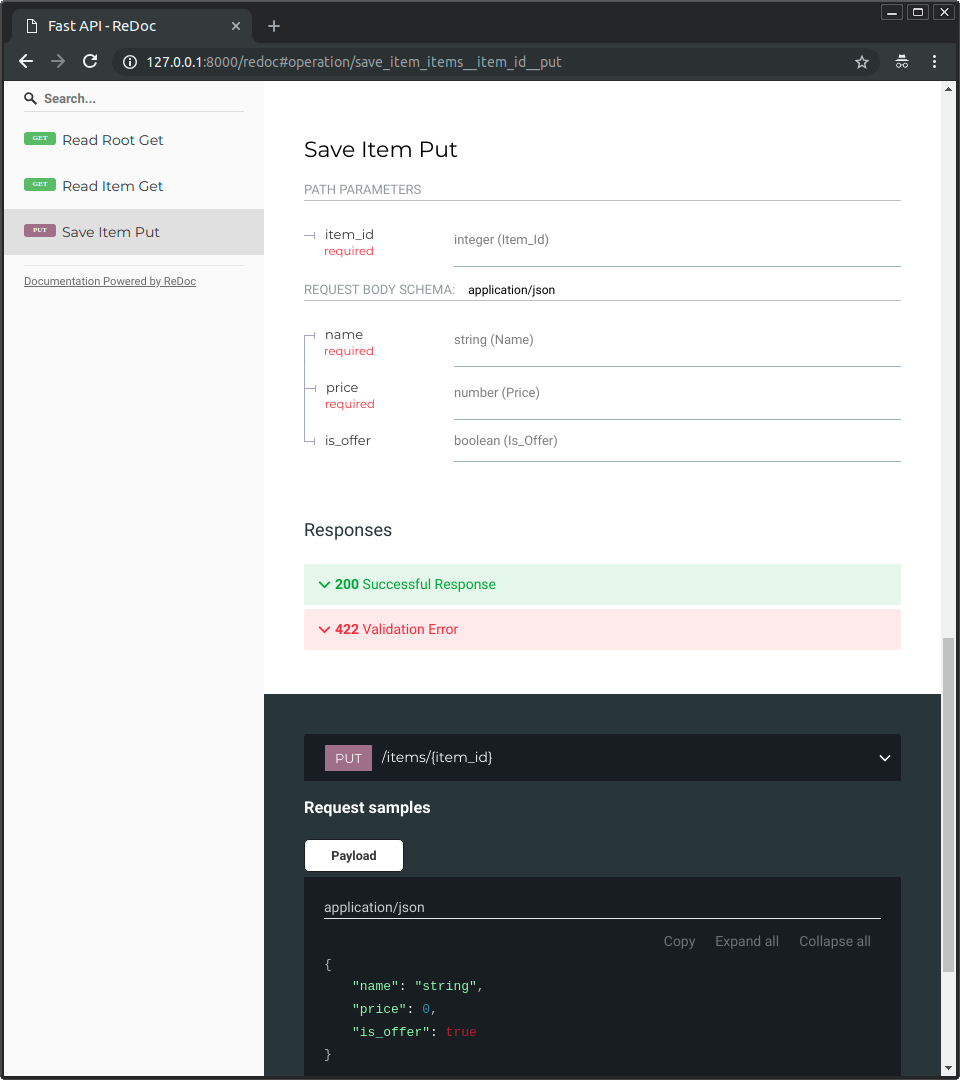- Sort Score
- Result 10 results
- Languages All
Results 361 - 370 of 2,262 for once (0.02 sec)
-
src/archive/tar/writer_test.go
t.Fatalf("Failed to read header: %s", err) } if header.Typeflag != TypeReg { t.Fatalf("Typeflag should've been %d, found %d", TypeReg, header.Typeflag) } } } // failOnceWriter fails exactly once and then always reports success. type failOnceWriter bool func (w *failOnceWriter) Write(b []byte) (int, error) { if !*w { return 0, io.ErrShortWrite } *w = true return len(b), nil }
Registered: Tue Sep 09 11:13:09 UTC 2025 - Last Modified: Mon Feb 03 16:38:43 UTC 2025 - 39.8K bytes - Viewed (0) -
docs/en/docs/python-types.md
Calling this program outputs: ``` John Doe ``` The function does the following: * Takes a `first_name` and `last_name`. * Converts the first letter of each one to upper case with `title()`. * <abbr title="Puts them together, as one. With the contents of one after the other.">Concatenates</abbr> them with a space in the middle. {* ../../docs_src/python_types/tutorial001.py hl[2] *} ### Edit it { #edit-it }
Registered: Sun Sep 07 07:19:17 UTC 2025 - Last Modified: Sun Aug 31 09:15:41 UTC 2025 - 17.1K bytes - Viewed (0) -
android/guava/src/com/google/common/collect/Iterators.java
* element anymore. Otherwise, when we remove from the old iterator, we may be invalidating * the new one. The result is a ConcurrentModificationException or other bad behavior. * * (If we decide that we really, really hate allocating two Iterators per cycle instead of * one, we can optimistically store the new Iterator and then be willing to throw it out if * the user calls remove().)Registered: Fri Sep 05 12:43:10 UTC 2025 - Last Modified: Thu Aug 07 16:05:33 UTC 2025 - 50.5K bytes - Viewed (0) -
tensorflow/c/c_api_function_test.cc
params->body_graph, s_, "add1"); ASSERT_EQ(TF_OK, TF_GetCode(s_)) << TF_Message(s_); TF_Operation* one = ScalarConst(1, params->body_graph, s_); ASSERT_EQ(TF_OK, TF_GetCode(s_)) << TF_Message(s_); TF_Operation* add2 = Add(add1, one, params->body_graph, s_, "add2"); ASSERT_EQ(TF_OK, TF_GetCode(s_)) << TF_Message(s_); params->body_outputs[0] = {add2, 0};
Registered: Tue Sep 09 12:39:10 UTC 2025 - Last Modified: Thu Jul 20 22:08:54 UTC 2023 - 63.6K bytes - Viewed (1) -
cmd/metacache-set.go
// to the options or to the current bucket ILM expiry rules. // Caller should close the channel when done. // The returned function will return the results once there is enough or input is closed, // or the context is canceled. func (o *listPathOptions) gatherResults(ctx context.Context, in <-chan metaCacheEntry) func() (metaCacheEntriesSorted, error) {
Registered: Sun Sep 07 19:28:11 UTC 2025 - Last Modified: Fri Aug 29 02:39:48 UTC 2025 - 30.7K bytes - Viewed (0) -
android/guava/src/com/google/common/collect/ImmutableCollection.java
* <li>The {@code copyOf} methods will sometimes recognize that the actual copy operation is * unnecessary; for example, {@code copyOf(copyOf(anArrayList))} should copy the data only * once. This reduces the expense of habitually making defensive copies at API boundaries. * However, the precise conditions for skipping the copy operation are undefined.
Registered: Fri Sep 05 12:43:10 UTC 2025 - Last Modified: Thu Aug 07 16:05:33 UTC 2025 - 21.4K bytes - Viewed (0) -
src/main/java/jcifs/audit/SecurityAuditLogger.java
private static final Logger log = LoggerFactory.getLogger(SecurityAuditLogger.class); private static final DateTimeFormatter ISO_FORMATTER = DateTimeFormatter.ISO_INSTANT; // Patterns for sensitive data - compiled once and cached private static final Pattern PASSWORD_PATTERN = Pattern.compile( "(?i)(password|passwd|pwd|secret|token|key|credential|auth)([\"']?\\s*[:=]\\s*[\"']?)([^\"',\\s]+)", Pattern.CASE_INSENSITIVE);
Registered: Sun Sep 07 00:10:21 UTC 2025 - Last Modified: Sat Aug 30 05:58:03 UTC 2025 - 26.6K bytes - Viewed (0) -
src/archive/zip/reader_test.go
} var count int var errRepeat = errors.New("repeated call to path") err = fs.WalkDir(zr, ".", func(p string, d fs.DirEntry, err error) error { count++ if count > 2 { // once for directory read, once for the error return errRepeat } return err }) if err == nil { t.Fatalf("expected error from invalid file name") } else if errors.Is(err, errRepeat) { t.Fatal(err) }
Registered: Tue Sep 09 11:13:09 UTC 2025 - Last Modified: Tue Mar 11 22:19:38 UTC 2025 - 56.6K bytes - Viewed (0) -
src/main/java/org/codelibs/fess/helper/SearchHelper.java
* Performs a scroll search for processing large result sets efficiently. * * This method uses OpenSearch scroll API to iterate through large numbers of * documents without loading them all into memory at once. * * @param params The search request parameters * @param cursor Function to process each document in the result set * @param userBean Optional user information for permission checkingRegistered: Thu Sep 04 12:52:25 UTC 2025 - Last Modified: Thu Aug 07 03:06:29 UTC 2025 - 35.8K bytes - Viewed (0) -
docs/en/docs/index.md
* The alternative documentation will also reflect the new query parameter and body:  ### Recap { #recap } In summary, you declare **once** the types of parameters, body, etc. as function parameters. You do that with standard modern Python types. You don't have to learn a new syntax, the methods or classes of a specific library, etc.Registered: Sun Sep 07 07:19:17 UTC 2025 - Last Modified: Sun Aug 31 10:49:48 UTC 2025 - 21.3K bytes - Viewed (0)